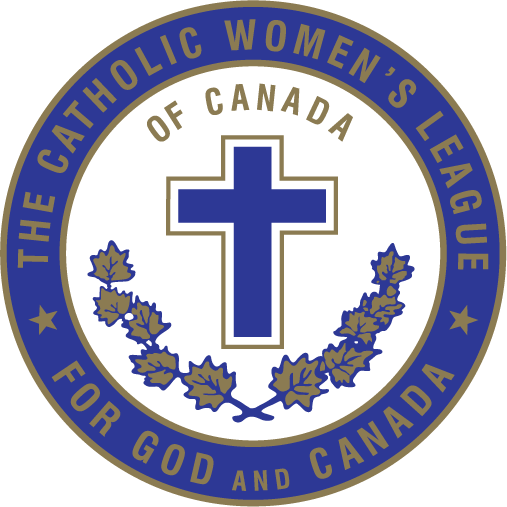Evelyn Rigby
B.C. & Yukon Provincial Council President
2017 Annual Report
Statistics
There were 128 parish councils in B.C. & Yukon Provincial Council, of which 89 chose to participate in the annual survey. Two parish councils did not have a president and a few councils rotated the presidency.
Sources for Informing Membership
Most popular sources of information starting with the highest were The Canadian League, diocesan newsletters and communiques, the provincial website with provincial communiques and parish bulletins.
Current National Priorities
Topping the list of issues introduced, discussed or acted upon by parish councils were palliative care, assisted suicide, the refugee crisis, conscience rights of healthcare providers and pornography. Lowest were rights of Indigenous offenders and the Goods and Services Tax exemption on child safety products.
Methods Used to Introduce these Topics
Time was allotted at meetings for discussion, the standing committee chairpersons gave reports and speakers on the topic were invited to meetings.
Foster Open Communication
One-half of parish councils met with their spiritual advisor monthly, while one-third rarely met. Over 10% of reporting councils met weekly, while less than 10% met annually. Most councils were well supported by their pastors, however nine councils reported the pastor was not supportive. Some pastors were too busy to pay attention to the League organization and/or its priorities. One pastor did not want to support one specific group. Several heartening comments reflected efforts to improve bonds with new spiritual advisors.
Resources Used to Preside at Meetings
Two-thirds of councils used the Constitution & Bylaws, and more than one-half used council policy and procedures manuals and the Executive Handbook. Less than one-half used Robert’s Rules of Order and the National Manual of Policy and Procedure.
Signing Authority
Parish council presidents most frequently signed cheques and banking documents. More than one-half of them signed petitions and letters directed within the League. It was disappointing to learn only one-third of them directed letters outside the League since letter writing is one of the main ways of supporting resolutions.
Provide Active Leadership
Almost all parish council presidents represented their members at church functions, funerals, diocesan meetings and conventions. More than one-half attended conferences, fundraising dinners and events. Just under one-half attended special masses, workshops, provincial meetings and conventions, World Day of Prayer and pro-life events. Few reported attending a national convention. Only one-tenth of them visited politicians.
Subsidizing Presidents to Attend Events
Just over one-sixth of presidents had their way to conferences fully paid and another one-sixth had to foot their own bill. For workshops, one-third paid all their own expenses. Approximately one-half were fully financially supported to attend diocesan conventions.
New Policies
Seventeen parish councils made changes to the financial section of council policy and procedures with most related to funeral costs. Funeral protocol also figured in changes. Three councils reviewed bursary/scholarship amounts. Two councils reviewed the council donations policy. Single items concerned archiving files, license for fundraising baskets, changing the expense sheet and cash sheet reporting form, limiting fundraising events, payment of dues for seniors in care homes, increase in per capita fees, youth evangelization support and $500.00 set aside for president or designate to attend a national or provincial convention. Thirteen councils reported making no changes, while a couple were still developing a council policy and procedure manual.
Executive Handbook
Seventy-three of 84 parish council presidents read the Executive Handbook to understand the duties of the executive team. Seventy-four indicated it had been helpful! Those that read it stated it had assisted in overseeing operations of the council. Ten presidents did not find it helpful; one found consultation with senior members to be a better alternative. One thought it lacked a code of conduct and procedures, although some aspects were helpful. One was too busy, and another was too sick to read it. One had three people on the executive, while another felt it unnecessary since they are “very low key.”
Annual Summary
One-half of parish council presidents gave an annual summary in the form of an oral report at the annual meeting. More than one-third provided a written report. One-third e-mailed the summary to members. Less than one-quarter reported in a newsletter or a parish bulletin. No reports were issued by one-quarter of the presidents.
Committees Other Than Standing Committees
Parish council presidents used other kinds of committees in addition to standing committees. The most numerous committee reported was running annual events such as teas and organizing bazaars. Approximately one-half of them had committees for fundraising, scholarships and bursaries. Next came social events and other catering. About one-quarter had visitation, donations and miscellaneous committees. Seven councils reported having no other committees.
President as Official Spokesperson
Almost three-quarters of parish council presidents spoke about membership, with over one-half speaking about social events and less than one-half addressing palliative care. One-third promoted bursaries and scholarships. Three presidents spoke about Indigenous issues. Ten presidents did not speak publicly. Other topics in descending order were local charitable projects, euthanasia, pornography, pro-life issues, refugees and mental health.
Use of League Letterhead
Close to two-thirds of parish councils used League letterhead when corresponding outside the League. Fourteen councils however, did not reference the membership total for the council in all external correspondence.
Greatest Assistance
Two-thirds of parish council presidents stated they received the most help from their immediate past president when assuming the presidency. Former past presidents also helped. The current executive, with secretary and treasurer singled out, also smoothed the way. Life members were mentioned as well.
Greatest Challenges
Most challenges resulted from not having a full slate of officers, closely followed by the difficulty of keeping members interested. Recruitment of new members followed. The amount of paperwork and meeting expectations were reported equally as the fourth most common challenge, with finding the time and feeling overwhelmed following.
National Theme
Three-quarters of parish council presidents found it beneficial to have a national theme and/or logo.
Additional Comments
There were 61 additional comments. Of these, 36 councils appeared to be doing well, with four neutral and 25 experiencing difficulty.
Provincial President’s Activities During 2017
• Delivered speech at the Vancouver archdiocesan sisters’ appreciation dinner
• Planned and ran two provincial mid-term meetings
• Brought greetings and presented workshops at Prince George and Victoria diocesan conventions
• Brought greetings to Military Ordinariate provincial convention in Comox
• Attended March for Life with new provincial banner
• Planned and presided at provincial convention in Kelowna
• Attended Life Canada’s second annual gala dinner in North Vancouver, and four other local events
• Attended two national executive meetings and the national convention meetings and prepared reports
Other Matters
• Sent a provincial annual report to national
• Brought one quilt to the national convention and presented an oral report using PowerPoint
• Distributed electronic copies of the parish mailing from national to the provincial executive
• Received and replied to hundreds of e-mails
• Reviewed minutes of two mid-term, pre- and post-convention executive meetings, and business sessions
• Collaborated on the “HMCS CWL Refit” provincial workshop for diocesan conventions
• Delegated the past president to investigate and recommend change of status for Whitehorse Diocesan Council
• Delegated presenters for Vancouver, Nelson and Kamloops conventions to first and second vice-president
• Delegated the first vice-president to attend a Serra celebration in Kamloops
• Posted spring and fall issues of The Communicator on the website
• Co-wrote a report for the fall edition of The Communicator
• Decided to develop a new provincial website with Status Holdings and intervened when necessary
• Canceled a spring meeting with government due to flip flop after the provincial elections
• Promoted writing letters to federal members of parliament (MPs) about Bill C-51 An Act to amend the Criminal Code and the Department of Justice Act and to make consequential amendments to another Act
• Wrote a letter to an MP requesting the removal of Section 176 from Bill C-51
• Sent a provincial petition regarding conscience rights and concerns regarding assisted suicide to the legislature
• Requested an interview with local staff of the Royal Canadian Mounted Police re Bill C-36 Protection of Communities and Exploited Persons Act
• Request the appointment of a new provincial spiritual advisor after the former’s retirement
• Tried to resolve a sensitive membership issue and obtain a policy from national for any parish involved
• Commissioned a video of a pro-life activist who was unable to attend convention
Achievements and Challenges
I found answering e-mails very burdensome however this was outweighed by the knowledge that the executive worked as a great team, and if a problem surfaced, there was always someone to pick up the slack. I want to acknowledge the strong support I have received from them all, especially my past president and president-elect. Any achievements I have accomplished are theirs too.


